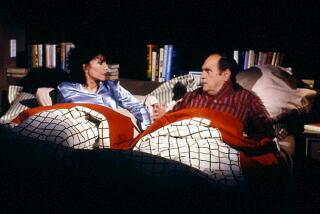Television review: ‘Bob’s Burgers’
- Share via
Fox welcomes another animated family to its Sunday-night cartoon block this weekend, and for once it has not been thought up by Seth MacFarlane, the “Family Guy” guy. The less phenomenal but more interesting Loren Bouchard, who produced “Dr. Katz, Professional Therapist,” co-created “Home Movies” and created “Lucy: Daughter of the Devil,” is the responsible party, working now, as before, with H. Jon Benjamin, who heads a cast of names familiar from the world of New York comedy, and New York-based comedies: Eugene Mirman, Kristen Schaal, John Roberts and Dan Mintz, whom you will have seen hanging around “Flight of the Conchords,” “The Daily Show” and “Important Things With Demetri Martin.” Jim Dauterive (“King of the Hill”) developed the series with Bouchard.
In “Bob’s Burgers,” Bob Belcher (Benjamin) and family run a struggling burger joint in what looks like a mid-Atlantic seaside town; as the curtain rises, the place is having a “re-re-re-opening,” with annoying son Gene (Mirman) dressed as a hamburger on the sidewalk and precocious younger daughter (Schaal) creating her own daily special: the Child Molester (“It comes with candy”). Later there is a visit from the health inspector, who has heard a rumor that there is human flesh in their meat and cautions Bob he will shut him down if he finds “anything above the 4% allowable by the FDA.”
Of the shows with which Bouchard has been associated, this is the most conventionally premised and, as if to propitiate Fox, possibly the least sophisticated: There is the family name, Belcher; an undertaker named Mort; some bathroom humor; genital jokes. The premiere is nonetheless diverting, if not immediately impressive, and there are nice rhythms and sharp asides and some other things to be said in its favor: It’s a show about the working class — or perhaps better put, the barely surviving entrepreneurial class — that is actually about work. And though the Belchers are hapless, they are not freaks, and though they are often at cross-purposes, they are not dysfunctional. “You’re my children and I love you, but you’re all terrible at what you do here,” Bob tells his kids. “I feel like I should tell you, ‘I’d fire you if I could.’”
Although the animation is certainly limited, it’s “Fantasia” compared with “Dr. Katz.” Still, apart from the fact that characters look funny — they have goggle eyes and a chinlessness that gives them the aspect of turtles — the comedy is primarily verbal: You could just as easily film the script with live actors. At the same time, what gives Bouchard’s series their special life is the way that the loose delivery — the actors record their parts together, and there’s improvisation allowed — bumps up against the inevitable formality of the animation, which is painstaking by nature even when characters don’t move much. That contrast has become the stylistic hallmark of a younger generation’s adult cartoons, and the irritated deadpan that is Benjamin’s signature the very sound of its comedy.







